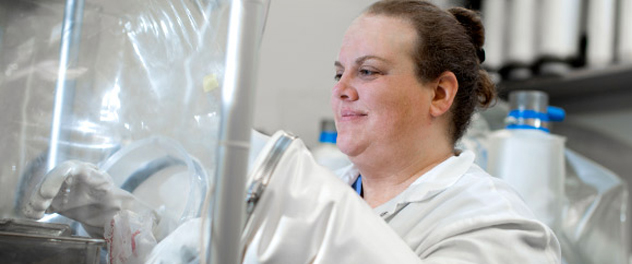 Germ-free murine isolators
Germ-free murine isolators
The germ-free murine facility allows lab members to deconstruct a complex system and mechanistically address the role of gut bacteria in maintaining health and causing disease.
Decoding the Small-Intestinal Microbiome
The small intestine has been implicated in gastrointestinal symptoms such as diarrhea, abdominal pain and bloating, but the role of small-intestinal microbiota, their microbial products, and their interaction with the intestinal epithelium and sensory innervation remain poorly understood. Most knowledge of the gut microbiome comes from studies of the colon; yet, the small intestine represents a unique and specialized niche with a distinct microbiome that likely plays critical roles beyond digestion.
The Gut Microbiome Lab's recent findings reveal that the composition of the small-intestinal microbiota is associated with gastrointestinal symptoms such as abdominal pain and diarrhea. But how the small-intestinal microbiota and their microbial products contribute to these symptoms remains a critical gap in understanding their role in gastrointestinal health and disease.
To address this gap, the lab has developed an innovative mouse model to investigate the biological effects of the human small-intestinal microbiome. Using advanced tools such as germ-free mice colonized with human microbiota, Ca²⁺ imaging, ex vivo preparations from transgenic mice, electrophysiology, optogenetics and high-resolution imaging, the lab is uncovering the molecular and cellular pathways through which microbial signals are detected and transduced in the small intestine.
Current approaches to targeting the small-intestinal microbiome often rely on antibiotics to suppress bacterial populations. However, these treatments lack specificity, killing beneficial bacteria alongside harmful ones and potentially promoting the development of antibiotic-resistant bacteria. The Gut Microbiome Lab's research aims to identify specific mechanisms by which small-intestinal microbes influence gastrointestinal function, including fluid secretion, transit time and permeability. The lab also is investigating how diet and environmental factors shape the small-intestinal microbiome and its impact on gut health.
By uncovering these mechanisms, the lab's work will pave the way for the development of targeted dietary and therapeutic interventions that address gastrointestinal symptoms while preserving the delicate balance of the small-intestinal microbiome.